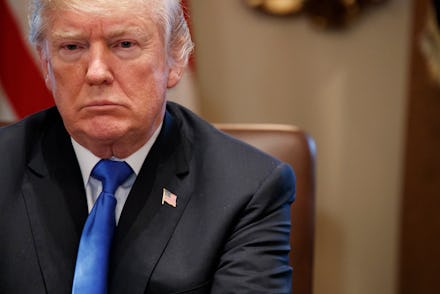The Bully Doctrine: Trump once again makes threats on the world stage — and has his bluff called

President Donald Trump this week suggested he may seek retribution against countries that voted for a United Nations resolution condemning his decision to officially recognize Jerusalem as the capital of Israel.
“Let them vote against us,” Trump said Wednesday. “We’ll save a lot. We don’t care.”
But that apparent threat to cut aid to countries supporting the measure, and Ambassador Nikki Haley’s suggestion that the United States could pull out of the U.N., didn’t work — 128 countries voted to pass the resolution, urging the United States to reverse its decision.
It was the latest example of Trump using threats as a negotiating tactic on the world stage — and of other world powers calling his bluff.
“It’s clear the rest of the world doesn’t take Donald Trump seriously,” Stephen Miles, director of Win Without War, a progressive foreign policy advocacy program of the Center for International Policy, said in a phone interview. “When most Americans don’t believe the president says truthful things, why would the rest of the world?”
Empty threats?
Before the U.N. vote Thursday, it seemed unlikely that Trump would end up following through on his threats, according to Dan Arbell, the former deputy chief of mission at the Israeli Embassy in Washington.
“It will be very difficult to carry this out,” said Arbell, now a nonresident senior fellow at the Brookings Institution’s Center for Middle East Policy. “It’s not impossible, but if he does, I think it will be more symbolic than anything else.”
As the New York Times reported earlier this week, following through on the threat would, in many cases, require congressional approval — and would likely alienate key allies in the Middle East.
“I’m not ruling out that he will take some stand or at least go through the motions and try to demonstrate that he’s not just all talk,” Arbell said. “But it’s hard to see how many members of Congress would be supporting such a move.”
Trump isn’t the only president to have failed to follow through on international threats — his predecessor, Barack Obama, famously said Syrian President Bashar Assad would be crossing a “red line” in 2012 if he used chemical weapons, but didn’t punish him after he launched a chemical attack on his own people in 2013.
But Trump was a harsh critic of Obama’s failure to act — both at the time and this year, when he launched an airstrike against the regime.
“President Obama said in 2012 that he would establish a ‘red line’ against the use of chemical weapons and then did nothing,” Trump said in April.
Still, Trump has issued his own series of threats he hasn’t been able to follow through on this year — most notably, against North Korea, which he vowed in September to “totally destroy” if it continued its nuclear provocations.
While such warnings have served to ratchet up the rhetoric between Washington and Pyongyang, they haven’t seemed to deter Kim Jong Un from continuing his nuclear program.
“I think it’s just another example of his recklessness,” Miles said. “It’s undermining America’s credibility.”
The threats to cut off aid — or cut ties with the U.N. — also echoed Trump’s promises to cut trade with China, which continues to conduct business with the Kim regime.
But, as the Times reported in September, “aggressively targeting China could disrupt the global supply chain, raising costs for American manufacturers. It could also inflame geopolitical tensions at a time when Washington needs Beijing’s help in dealing with North Korea.”
As such, his stern warnings frequently lack much teeth.
Trump did not appear to issue a public reaction to Thursday’s U.N. vote, but Haley — bizarrely — invited the countries that did not cast a ballot condemning the U.S. decision to a “friendship” party.
Former CIA director John Brennan slammed the Trump administration Thursday over the threats, saying they were “outrageous.”
“[Trump] expects blind loyalty and subservience from everyone — qualities usually found in narcissistic, vengeful autocrats,” he wrote.